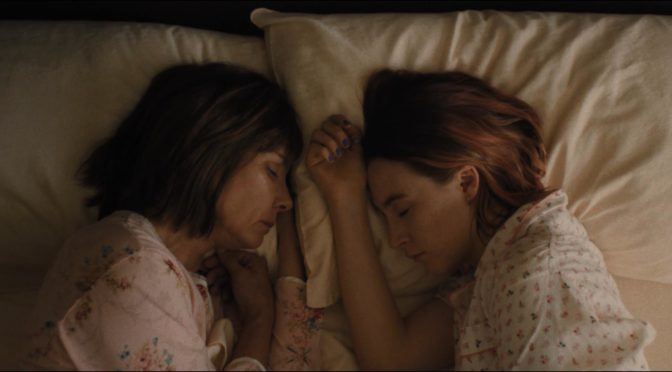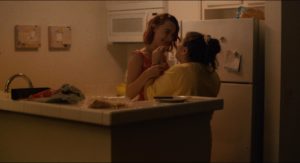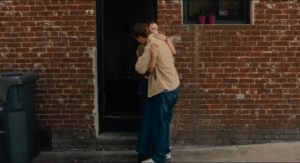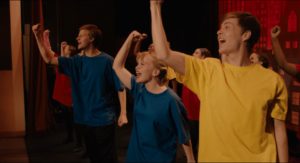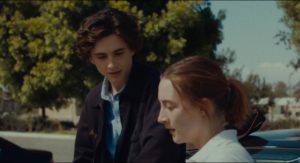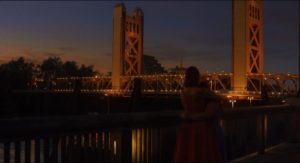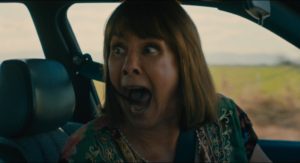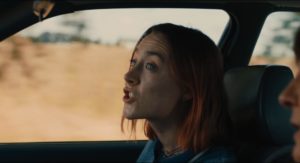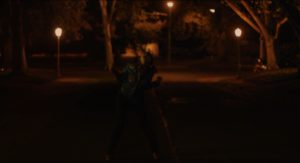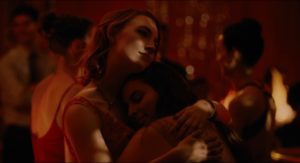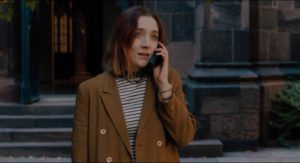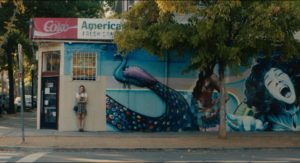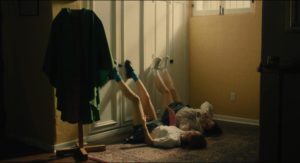I am recently thirty-six years old and I am unashamed to say that I tear up in movies. I tear up in them more now than I did two years ago, which was already considerably more than I did five years before that. It’s been an escalating trend with me. As a young teenager, it would happen with a select handful of films, the most reliable of which was, and maybe still is, Field of Dreams, that lovely plate of steak and potatoes that I still love so well. If I was ever offered a million dollars to cry on cue, humming the closing strains of James Horner’s “The Place Dreams Come True” would be about as reliable strategy as I can name. But as I grow older and ever more in love with the cinema, it takes less and less to make my eyes mist over. I spent the closing hours of one of my dating anniversaries blubbering like an infant to the final monologue of Mrs. Doubtfire on TNT, while my future fiancé lay blissfully passed out and blessedly oblivious to my shameful little display. Now that the dam in front of my moviegoing retinas has completely crumbled, the most liberating revelation has been realizing that it doesn’t take sadness or even a particularly dramatic kind of joy to get the tears flowing. I can tear up at comedies, dramas, thoughtful documentaries, musicals, and droll animated films. And so, just as I did with The Florida Project (my other favorite film of 2017), I have come up with a term to describe my official number one film of 2017. Lady Bird, Greta Gerwig’s lyrical, witty, sweetly observant, and deliriously humanistic high school dramedy, is the quintessential Damp Face Movie TM. What this means is that there was nary a moment in this priceless, compact little gem of a movie where my eyes weren’t dewy and glistening in the best possible ways. To be clear, the Damp Face honor (I am now considering handing the award out annually) doesn’t just go to a film that makes my eyes well up. This is not an award for the film with the biggest cry (which surely goes to The Florida Project’s roundhouse kick of an ending), but the film that holds my eyeballs in a suspended state of emotional catharsis for as much of its runtime as possible. Lady Bird has moments of riotously funny humor, impossibly endearing human interactions, and stirring pathos, and it plays each those notes in a way that is clear, unpretentious, and undeniably affecting. It pirouettes between all its emotional poles with astounding finesse. It glides around them as if there were no distinction between laughter, thoughtful reflection, and melancholy. In so doing, it becomes that deceptively trick, rare thing that only the very best of such films can manage to be: utterly, authentically human. In a year that offered some astounding cinematic achievements, the most jaw-dropping of all of them was just to watch Greta Gerwig walk out on stage with humble, self-deprecating composure and deliver the softest, most unassuming knockout punch in all of 2017 cinema. Lady Bird is a sparkling comedy and an emotional juggernaut fused seamlessly together. It is a tearjerker of uncanny, sprightly effervescence; an intoxicatingly soulful character study to have you smiling through bleary eyes.
One of Lady Bird’s finest qualities is that it takes a genre that is not often particularly inspired and reminds us that it can be lively, deep, and invigorating. Every category of art deserves its masterworks, those great entries that remind us that brilliance can happen in any form. Hair metal has its Appetite For Desctruction. The parody film has Young Frankenstein. And now, with full respect to terrific movies like Mean Girls, The Spectacular Now, and Clueless, I believe the high school movie may have just served up its filet mignon in Lady Bird. Lady Bird is simply the story of one year, Senior year to be exact, in the life of a seventeen-year old Sacramento native named Christine MacPherson. She has bestowed herself with the name Lady Bird as a means of carving out some semblance of individuality that she believes her Catholic school and the sprawling capitol city around it do not provide her. In a breezy ninety-seven minutes, we follow Lady Bird through her last year as a high schooler, as she navigates her social world and waits to see what colleges will accept her. Her mediocre grades mean she will probably end up at a nearby public university, but she dreams of attending some lofty East Coast institution where she will be steeped in the kind of highbrow culture she feels her hometown lacks. In an attempt to stand out on her applications, Lady Bird ends up auditioning for the school play with her shy, big-hearted and bookish friend Julie (Jonah Hill’s younger sister, Beanie Feldstein, splendidly sweet and almost unthinkably endearing). She also forms a crush on the school’s best actor, an earnest red-headed young man named Danny (Manchester By the Sea’s Lucas Hedges, adding another impressive performance to his extremely promising young career). Lady Bird’s fractious, begrudgingly fond relationship with the city of Sacramento (the city where Greta Gerwig herself grew up) and her efforts to one day escape its orbit are nominally the plot of the film, though Lady Bird is so intuitively an emotional character study that I never think of it in such linear terms. It is more a cohesive, insightful, and funny series of impressions from one fateful year in a young woman’s life, like a delightfully heartfelt and impeccably written collection of diary pages. It is an empathetic assortment of touching, ticklish, and engaging anecdotes that let us in to the good-natured, sometimes pseudo-intellectual, and always rebellious soul of its protagonist. It is also about getting to know Lady Bird’s world and the many people in it, all brought to beautiful, bristling life by 2017’s best ensemble cast. This is a perfectly curated Murderer’s Row of talent, consisting of legends of stage and screen (Stephen Henderson, Lois Smith, multiple Tony-winner Laurie Metcalf, the Tony-and-Pulitzer-winning Tracy Letts) and meteorically ascending young talent (Saoirse Ronan, Lucas Hedges, and Timothee Chalamet, not a one of them above the age of twenty-seven, already have six Oscar nominations and numerous critics awards between them). The film is about Lady Bird’s relationships with her family, friends, and classmates. Above all, it is about the fundamentally loving but frequently testy relationship between Lady Bird and her hard-working, persistently critical mother, Marion (Laurie Metcalf, in a performance of staggering nuance, humor, and gravitas). Marion and Lady Bird both house a complex mixture of pride and embarrassment about their lower-middle class circumstances. This sense is exacerbated by the fact that Lady Bird’s parents have enrolled her in an affluent Catholic school, where much of the student body lives in pristine two-story houses. Lady Bird is the least well off of her classmates and her aging father (Tracy Letts, a warmly self-deprecating pillar of decency, in the year’s most masterful small performance) has just lost his job as a programmer. Lady Bird is an endlessly heartwarming, honest, and funny coming of age story about the power of place and the weight of upbringing. It is about the interplay between the identity that others give to us throughout our lives and the identities we try to give ourselves. It is a clear-eyed and tender thing of beauty. This is simply a high school movie in the same way that Richard Linklater’s Before Sunset is simply a romantic tour of Paris. Its small, seemingly straightforward package holds a vast world of feeling, vibrant characterization, and human truth.
Like Linklater’s Before films, Lady Bird shares a sense of something organically soulful and human. Beyond the clear stakes of their plots, there is a feeling of something rich in the simple act of people knowing each other, sparring with each other, bouncing their whims and wills off of one another. Their apparent smallness in the grand scheme, whether just about two people finding romance or just a young woman deciding who she will be outside of high school and hometown, belies their ability to capture the full weight of life. Films like Lady Bird are reminders that no story need feel small because any life is a poignant and momentous thing to the person living it. To quote Harvey Pekar in American Splendor, “Ordinary life is pretty complex stuff.” Beyond their ability to house tidal waves of feeling in teacup worlds, Lady Bird also shares with the Before series a keen sense of place. As someone who has been to Sacramento many times and will soon marry a native of the California capitol, I can personally say that Greta Gerwig’s evocation of this place is sharp, observant and loving. And this is a lovely thing in part because each little corner of this strange, wide world of ours deserves its own piece of poetry. There are a great many places in this world that I have never seen, but I always hope there is an artist out there somewhere working away to capture some tiny, essential piece of the soul of those places. Still, for argument’s sake, let’s say that you have no exposure to the sprawling, creative charms of Sacramento and no expectation that you will ever visit there. In that case, perhaps the extent to which Lady Bird accurately captures Sacramento would be unknown to you and you might ask why this facet of the film matters. You do not know the place and you will not feel those flickers of recognition when shots of the city’s lovely Tower Theater flash by or when a scene plays out in the city’s famous rose garden. This is a tough argument for me to make because I obviously can never divorce myself from knowing Sacramento. I will never watch Lady Bird without having that perspective. And yet, I feel confident in saying that what Gerwig bottles here is a sense of the value and power of a place that transcends familiarity. This goes beyond the need to know Sacramento or to have visited there. The film’s lyrically dreamy editing stitches together impressions of this place that hold their own mystical weight. They are powerful to me not because I have been to these places (or not simply for that reason anyway), but because one can sense that Gerwig has been to these places and that each one of them holds stories and enigmatic meanings known only to her. Lady Bird, like many a great work of art, speaks from a specific place while also keeping one foot in the universal. One need not have lived in Sacramento to grasp Lady Bird’s sweet and caustic dialectic between treasuring home and wanting to journey as far from it as possible; to remember that our childhood homes could be both our shackles and our sanctuaries. The old haunts we grew up around and yearned to be free of were still part of our reveries because how could they not be? They had forged us, with all the pain, discomfort, growth, and strength that word implies. In a beautiful and understated way, Gerwig speaks of home as a place we dream of escaping so that we can lie in a strange bed and dream of returning to it. Yes, Lady Bird is an exquisitely lovely ode to Sacramento. But beyond that, it is among the most sweetly soothing essays ever made about home as salve and irritant, and about wrestling with that complicated tension between gratitude for what it gave us and relief that our worlds eventually expanded past it.
And in a similar way, Lady Bird is about that same mixture of love, appreciation and rebellion between parents and their children. In the same way that it is the story of Christine MacPherson struggling to define herself as both a Sacramento native and someone longing to be free of that place, it is also the story of who Christine is as both a product of her parental upbringing and as an individual seeking to exist and grow outside of that influence. That is a very, very clinical way of saying that Lady Bird is possibly the most wonderful, wise, and poignant portrait of a mother and daughter relationship that I have ever seen. A lot of the beauty in the powerful parallels and stark differences between Lady Bird and Marion come from the lovely, sharp writing, which can be nakedly emotional and painful but never comes within a sight of cynicism. Even the most heartbreaking scenes of discord come from a place of gentle, honest, humanism. Gerwig has a talent for sharp, cutting dialogue, but her directorial sense could not be more loving and compassionate. As a result, Lady Bird becomes a tender and clear-eyed journey through a remarkably nuanced relationship where we feel both bruised and emotionally secure. Gerwig is aided immeasurably by Ronan and Metcalf, giving two of the greatest performances by any performer in 2017. This is a film that can take us into places of genuine sadness and catharsis without ever becoming shrill or unpleasant. We may dab our eyes with recognition at its hard truths, but the smile is never far from our faces. It is the smile of knowing in our hearts that human beings are messy and sometimes selfish, that children can be myopically self-centered and reckless with their words, that parents are frail and imperfect. That every single person on this planet, be they seventeen or seventy-two, is frail and imperfect. It is the smile of recognizing all that and loving humanity all the more for it. I have watched these fights or been involved in arguments like them myself when I was a stubborn teenager. They are real, raw, and rich with feeling and insight. Each one comes with its share of winces and both characters have their moments where they are completely, cruelly in the wrong. But each scene also carries its share of belly laughs or sweet rays of levity, as in the already famous scene where Marion and Lady Bird pause their quarreling to coo over a dress they both like. And when the momentary squall of drama is done, we move on to a scene of pure comedy. But, regardless of the tenor of the scene, the emotional potency never lets up for a minute. And this is what makes Lady Bird 2017’s Damp FaceTM masterpiece.
Five years ago, Greta Gerwig wrote another character-centric classic and also starred in it. It was her now-paramour Noah Baumbach’s Frances Ha, a bittersweet, gnagly, lovingly critical look at a twenty-something dancer losing her boyfriend, roommate, and New York City apartment, and trying gamely to land on her feet. One of the film’s already iconic shots is of Gerwig’s Frances making her way across a New York City crosswalk like the world’s most awkward and exuberant ballerina. She pirouettes and flings her lanky dancer’s body in front of taxi cabs and city buses and turns the act of going down town into an impromptu dance recital. This is maybe the pivotal shot of early Greta Gerwig, when she was just a brilliant writer and actor. She is perched at the exact border between clumsiness and a beautiful, mesmerizingly unsteady kind of self-possession. As Gerwig’s protagonist and autobiographical surrogate, Lady Bird MacPherson is very much like an adolescent Frances. She is a confident, smart young woman and also an awkward, ungainly presence. Pithy witticisms pour out of her mouth just in time for her foot to end up there. I love the Gerwig archetype: a strong, intelligent woman with a New Yorker’s urbanity, a Tatiesque kind of clumsy curiosity, and a distinctly 21st century kind of aimlessness. However, while the classic Gerwig character recipe may be two parts clumsiness to one part grace, I have to say that Gerwig herself is only growing more graceful and composed by the day. Considering she is one of the finest actors we have, maybe the clumsiness was always just part of the performance. With Lady Bird, I am enchanted and amazed to see how she has retained her own ramshackle charm, but refined it into a new luminous form. Any hint of anything even resembling cynicism have been lost and what remains is honest insight into human behavior without a hint of mockery or judgment. Gerwig has retained her love for human fallibility and social mishaps, but as the woman sitting in the Big Director’s Chair, she now brings her own almost impossibly kind sensibility to the proceedings. Greta Gerwig is not Noah Baumbach. She is still curious about human flaws: about pride, brash youthful exuberance, putting on intellectual airs, and trying on new identities as we stumble through life. But she has no interest in patronizing anyone for their mistakes or weaknesses. Lady Bird is a film that loves people for their mistakes and weaknesses. Her observations of life are not sugarcoated because no sugar is needed. The filter of her directorial vision is so unfailingly tender and understanding that her hardest blows do not leave real bruises. They are not intended to cause pain, but to inspire clear reflection. And all of this is just my way of belaboring the basic point that, in a year full of fancy cinematic cocktails, Greta Gerwig gave 2017 its glass of sweet, cold spring water. Lady Bird is simply the kindest thing these jaded eyes took in all year. And kindness is what 2017 needed most.
Artists like the Greta Gerwigs and the Richard Linklaters of the world have appealed to me for a long time. I have long had a love for authors, be they writers or filmmakers, who paint in small-scale human colors. I recently realized that I can trace the germ of what makes me love this empathetic, lyrical kind of storytelling back to the first real, honest-to-goodness novel I ever read. I was a tender nine years old and I picked up Louisa May Alcott’s Little Women at the Danville Public Library. I finished it and gobbled up Alcott’s Little Men a few weeks later. The feeling of kinship with these kinds of stories and their loping, vignette-style structure was instantaneous and deeply felt. What these novels share with works like the Before series and Lady Bird is a sense that character is really driving the story and that the best kind of plots are just about watching people we like grow and change. Important events occur in the characters’ lives, but there is the unmistakable sense that we would be following these people no matter what was happening to them. What takes place in the story is less important than the fact that we are getting to know human beings; that, for the next two hours or four-hundred pages they are our human beings. There are naturally larger overarching plots, but mostly we are just witnessing these small, richly drawn lives as they are lived day to day. The plot exists only insofar as these lives are moving forward and each new bit of action, be it monumental or trivial, is another sentence, paragraph, or chapter in the story of who these people are. Sometimes the action is seismic, a major moment that changes the characters’ destinies forever. Jo March meeting her husband for the first time or Beth March passing away tragically young. But, just as often, there are brief moments, single paragraph excerpts, that represent little more than the smallest of stones on the pathway of their lives. Maybe it’s just a single pleasant day the March sisters spend playing in the countryside or the week they spend putting together a holiday play. Moments like these may not radically alter the road the characters are walking, but they are just as much a part of that road. In a way, the fact that these tiny moments are not held up as anything more important than what they are makes them feel more precious, more resplendent in their tiny transience. It is no wonder that I love Linklater’s Boyhood with its notion that life is the accumulation of fleeting, seemingly inconsequential moments. I first felt that way myself when I was only nine years old and made my first fond acquaintances with the March sisters. And now, much to my delight, I have learned that Gerwig’s sophomore directorial effort will be none other than Little Women. Based on her first blissful outing as director, I can scarcely picture a more perfect marriage of auteur and source material. Lady Bird filled me with many of the same feelings I had the first, second, and third times I read Alcott’s novel. The film is 2017’s most vibrant, lovingly frayed quilt; a patchwork of deep conversations and foolish misadventures and youthful flights of fancy and joyful, trivial memories. It captures life as a swirl of formative milestones and gleefully ethereal little anecdotes that we may not even fully remember in five years’ time. Gerwig has assembled her own impressions of growing up in Sacramento and sequenced them, large and small, into a raucous, soul-stirring greatest hits album about growing up. Her modest, delicate, charmingly self-effacing opus is full of epic suites, simple ditties and everything in between. Life is made of such stuff.
